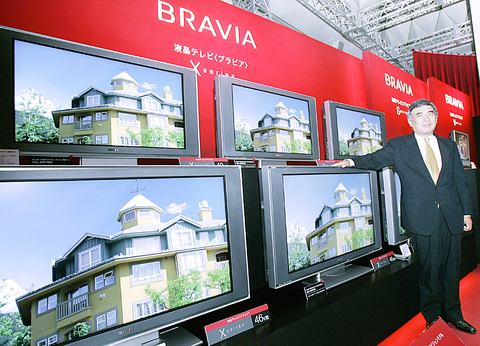Samsung Electronics Co and Sony Corp had to overcome cultural barriers in their joint liquid-crystal display (LCD) venture but by doing so created a new market, according to a top Samsung executive.
The two global electronics giants established S-LCD Corp in the city of Asan, about 90km south of Seoul, in April 2004 to produce panels to meet soaring demand for flat screen televisions.
Sony's Japanese devotion to detail ran up against Samsung's Korean-style emphasis on speed, Lee Sang-wan, president and CEO of Samsung's LCD business, told reporters.

PHOTO: AP
"So at first it worked as a cultural barrier between the two companies or two countries but now it is becoming a synergy," he said. "They are very detail oriented and we are very speedy at working."
Lee made the comments on Friday but they were embargoed for release till yesterday by Samsung.
Global demand for flat screen televisions has soared as consumers abandon their bulky cathode ray tube sets for the thinner, sleeker versions.
Samsung said on Thursday it expects the global market for LCD TV panels to grow 53 percent to 73 million units next year.
Samsung and Sony currently produce 40-inch and 46-inch panels using Samsung technology at their "seventh-generation" production line, a sleek, state-of-the art facility staffed by industrial robots and humans working in special "clean rooms."
"We created the 40-inch LCD TV market with Sony," said Lee, who attributed its success to the popularity of Samsung's Bordeaux and Sony's Bravia models, which both use panels made at the facility in Asan's Tangjeong district.
"Sony's role in opening that market and realizing growth has been important," he said.
The companies, whose products such as televisions and personal computers compete against each other in global markets, cooperate in LCD panels to ensure supply.

MAKING WAVES: China’s maritime militia could become a nontraditional threat in war, clogging up shipping lanes to prevent US or Japanese intervention, a report said About 1,900 Chinese ships flying flags of convenience and fishing vessels that participated in China’s military exercises around Taiwan last month and in January last year have been listed for monitoring, Coast Guard Administration (CGA) Deputy Director-General Hsieh Ching-chin (謝慶欽) said yesterday. Following amendments to the Commercial Port Act (商港法) and the Law of Ships (船舶法) last month, the CGA can designate possible berthing areas or deny ports of call for vessels suspected of loitering around areas where undersea cables can be accessed, Oceans Affairs Council Minister Kuan Bi-ling (管碧玲) said. The list of suspected ships, originally 300, had risen to about

DAREDEVIL: Honnold said it had always been a dream of his to climb Taipei 101, while a Netflix producer said the skyscraper was ‘a real icon of this country’ US climber Alex Honnold yesterday took on Taiwan’s tallest building, becoming the first person to scale Taipei 101 without a rope, harness or safety net. Hundreds of spectators gathered at the base of the 101-story skyscraper to watch Honnold, 40, embark on his daredevil feat, which was also broadcast live on Netflix. Dressed in a red T-shirt and yellow custom-made climbing shoes, Honnold swiftly moved up the southeast face of the glass and steel building. At one point, he stepped onto a platform midway up to wave down at fans and onlookers who were taking photos. People watching from inside

Japan’s strategic alliance with the US would collapse if Tokyo were to turn away from a conflict in Taiwan, Japanese Prime Minister Sanae Takaichi said yesterday, but distanced herself from previous comments that suggested a possible military response in such an event. Takaichi expressed her latest views on a nationally broadcast TV program late on Monday, where an opposition party leader criticized her for igniting tensions with China with the earlier remarks. Ties between Japan and China have sunk to the worst level in years after Takaichi said in November that a hypothetical Chinese attack on Taiwan could bring about a Japanese

STREAMLINED: The dedicated funding would allow the US to transfer equipment to Taiwan when needed and order upgraded replacements for stockpiles, a source said The US House of Representatives on Thursday passed a defense appropriations bill totaling US$838.7 billion, of which US$1 billion is to be allocated to reinforcing security cooperation with Taiwan and US$150 million to replace defense articles provided to the nation. These are part of the Consolidated Appropriation Act, which the US House yesterday passed with 341 votes in favor and 88 against. The act must be passed by the US Senate before Friday next week to avoid another government shutdown. The US House Committee on Appropriations on Monday unveiled the act, saying that it allocates US$1 billion for the Taiwan Security Cooperation Initiative